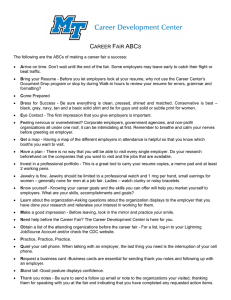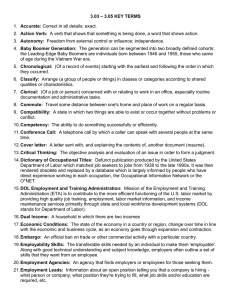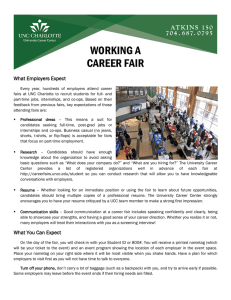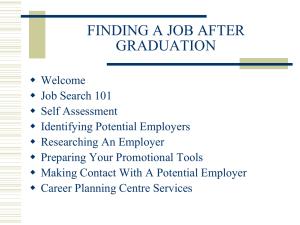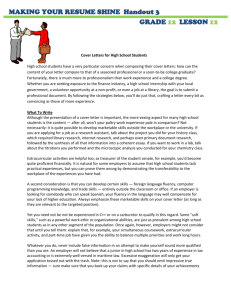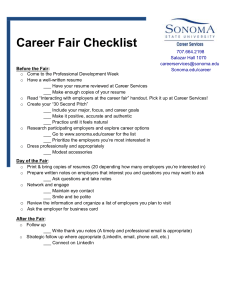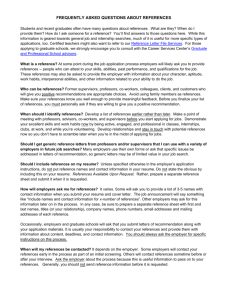3.04 Vocabulary
advertisement
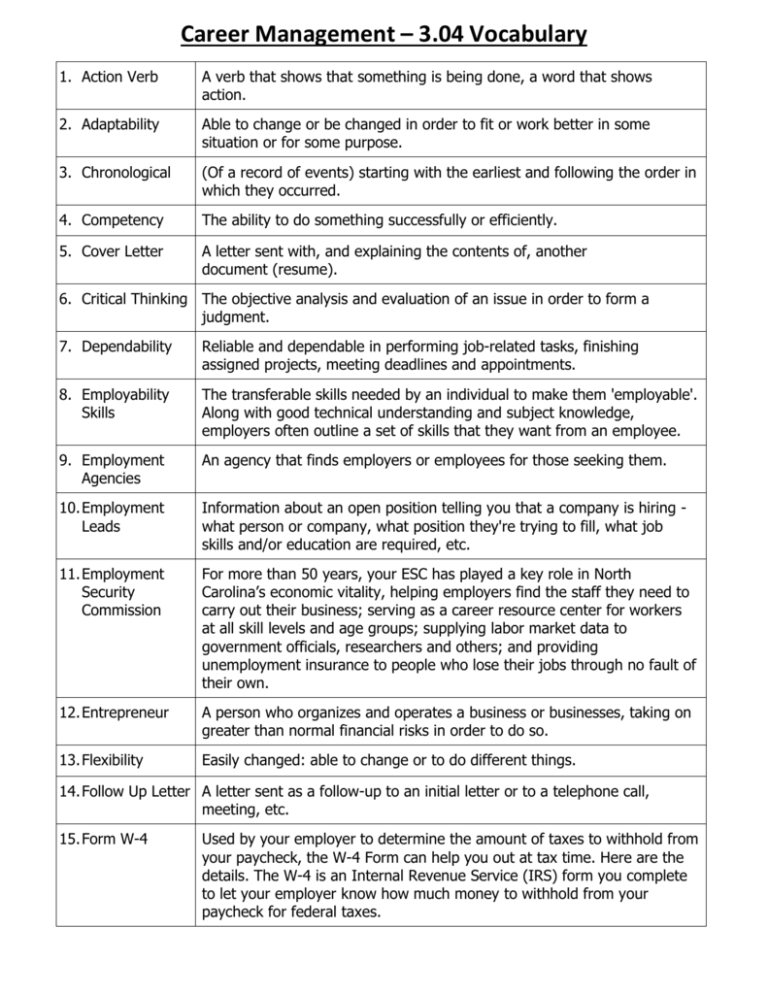
Career Management – 3.04 Vocabulary 1. Action Verb A verb that shows that something is being done, a word that shows action. 2. Adaptability Able to change or be changed in order to fit or work better in some situation or for some purpose. 3. Chronological (Of a record of events) starting with the earliest and following the order in which they occurred. 4. Competency The ability to do something successfully or efficiently. 5. Cover Letter A letter sent with, and explaining the contents of, another document (resume). 6. Critical Thinking The objective analysis and evaluation of an issue in order to form a judgment. 7. Dependability Reliable and dependable in performing job-related tasks, finishing assigned projects, meeting deadlines and appointments. 8. Employability Skills The transferable skills needed by an individual to make them 'employable'. Along with good technical understanding and subject knowledge, employers often outline a set of skills that they want from an employee. 9. Employment Agencies An agency that finds employers or employees for those seeking them. 10. Employment Leads Information about an open position telling you that a company is hiring what person or company, what position they're trying to fill, what job skills and/or education are required, etc. 11. Employment Security Commission For more than 50 years, your ESC has played a key role in North Carolina’s economic vitality, helping employers find the staff they need to carry out their business; serving as a career resource center for workers at all skill levels and age groups; supplying labor market data to government officials, researchers and others; and providing unemployment insurance to people who lose their jobs through no fault of their own. 12. Entrepreneur A person who organizes and operates a business or businesses, taking on greater than normal financial risks in order to do so. 13. Flexibility Easily changed: able to change or to do different things. 14. Follow Up Letter A letter sent as a follow-up to an initial letter or to a telephone call, meeting, etc. 15. Form W-4 Used by your employer to determine the amount of taxes to withhold from your paycheck, the W-4 Form can help you out at tax time. Here are the details. The W-4 is an Internal Revenue Service (IRS) form you complete to let your employer know how much money to withhold from your paycheck for federal taxes. 16. Geographic mobility The measure of how populations move over time. Geographic mobility, population mobility, or more simply mobility is also a statistic that measures migration within a population. 17. Honesty Fairness and straightforwardness of conduct, adherence to the facts : sincerity. 18. Hourly Wage An amount of money paid each hour to compensate an employee for the amount of time he/she spends working. 19. Information Facts provided or learned about something or someone. 20. Interpersonal Skills Life skills we use every day to communicate and interact with other people, both individually and in groups. People who have worked on developing strong interpersonal skills are usually more successful in both their professional and personal lives. 21. Letter of Application Also known as a cover letter, is a document sent with your resume to provide additional information on your skills and experience; provides detailed information on why are you are qualified for the job you are applying for. 22. Master Having or showing very great skill or proficiency. 23. Networking Interact with other people to exchange information and develop contacts, especially to further one's career. 24. Preemployment tests Tests that organizations give to job applicants to help them hire employees who are productive, dependable, and low-turnover. 25. Problem Solving The process of finding solutions to difficult or complex issues. 26. Resource A stock or supply of money, materials, staff, and other assets that can be drawn on by a person in order to function effectively. 27. Resume A brief account of a person’s education, qualifications, and previous experience, typically sent with a job application. 28. Salary A fixed regular payment, typically paid on a monthly or biweekly basis but often expressed as an annual sum, made by an employer to an employee, especially a professional or white-collar worker. 29. SelfEmployment A situation in which an individual works for himself or herself instead of working for an employer that pays a salary or a wage. A selfemployed individual earns their income through conducting profitable operations from a trade or business that they operate directly. 30. Skill Verbs Use these verbs to describe your skills and accomplishments when writing your resume and cover letters -- to increase the strength of your writing and make potential employers take notice! 31. Technology Management The field concerned with the supervision of personnel across the technical spectrum and a wide variety of complex technological systems.

